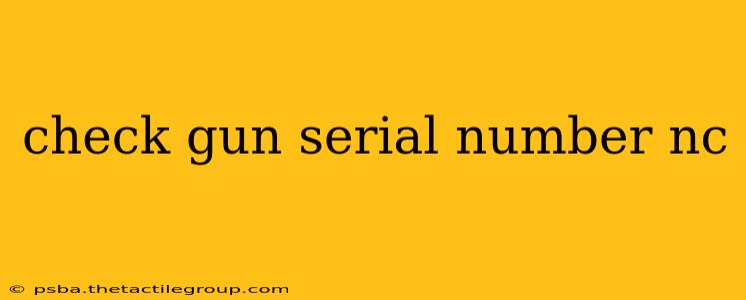Finding out information about a firearm in North Carolina often involves checking its serial number. This process can be crucial for various reasons, from verifying ownership to tracing a stolen weapon. However, the path to accessing this information isn't always straightforward. This guide breaks down the process of checking gun serial numbers in NC, highlighting the limitations and legal considerations involved.
Who Can Check a Gun Serial Number in North Carolina?
Unlike some states, North Carolina doesn't offer a public database where anyone can input a serial number and instantly receive information about the firearm's history. Access to firearm information is largely restricted to law enforcement agencies and licensed firearms dealers.
Law Enforcement: Local, state, and federal law enforcement agencies have access to databases like the National Crime Information Center (NCIC) and potentially state-specific systems. They use these databases to trace weapons used in crimes, investigate ownership, and perform other law enforcement functions.
Licensed Firearms Dealers: Federally licensed firearms dealers (FFLs) may have access to certain databases relevant to firearm transactions, though the extent of their access varies. They may be able to help with tracing a gun's history if they are involved in a legitimate transfer or investigation.
Private Citizens: Private citizens generally do not have direct access to databases containing firearm registration information. Attempting to access such information without proper authorization could be illegal.
Why You Might Need to Check a Gun Serial Number
There are several legitimate reasons why someone might need to check a firearm's serial number in North Carolina:
- Verifying Ownership: If you're buying a used firearm, checking the serial number can help verify the seller's ownership and ensure the gun hasn't been reported stolen.
- Stolen Firearm Reporting: If your firearm is stolen, reporting the serial number to law enforcement is crucial for recovery efforts.
- Legal Proceedings: Serial numbers are often essential evidence in legal cases involving firearms.
- Inheritance: Determining the proper ownership of firearms passed down through inheritance requires verifying serial numbers and ensuring compliance with state and federal laws.
What Information Can Be Obtained?
The information available from a serial number check is limited and depends on the database accessed. Even law enforcement may not always find comprehensive information. Possible information includes:
- Manufacturer: The company that manufactured the firearm.
- Model: The specific model of the firearm.
- Date of Manufacture: An approximate date when the gun was produced.
- Previous Ownership (Limited): In some cases, records of previous transactions may exist, but this isn't always guaranteed.
Legal Considerations
It's crucial to understand the legal aspects of checking gun serial numbers in North Carolina. Unauthorized access to firearm registration databases is a crime. Only authorized personnel, like law enforcement, can access these systems legally. Attempting to circumvent these regulations can lead to serious legal consequences.
Alternative Methods for Verifying Firearm Information
While direct serial number checks may be limited, there are alternative methods to verify firearm information:
- Contacting the Manufacturer: You can try contacting the firearm manufacturer directly with the serial number. However, they may not be able to release detailed information about the firearm's history.
- Engaging a Licensed Attorney: If you're involved in a legal matter involving a firearm, an attorney can help navigate the process of obtaining relevant information.
Conclusion
Checking a gun serial number in North Carolina is not a simple process for private citizens. Access to comprehensive firearm information is largely restricted to law enforcement and licensed firearms dealers. Understanding the limitations and legal considerations involved is crucial to avoid potential problems. If you have specific concerns about a firearm's history, it's best to consult with law enforcement or a qualified legal professional.

